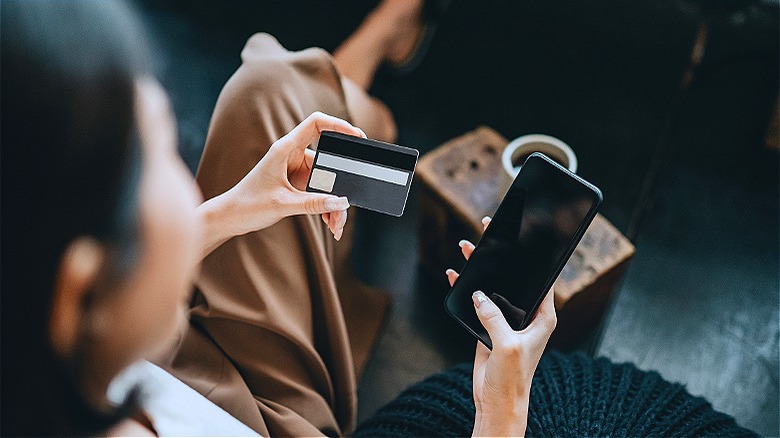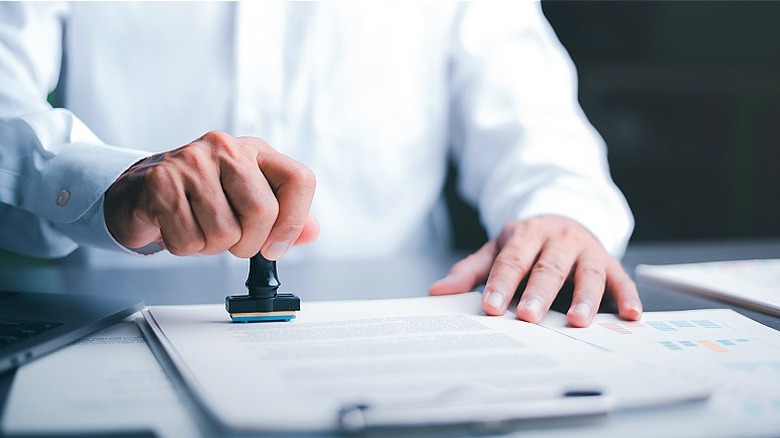Do Banks Monitor Your Spending Habits?
While worrying about your credit score can be stressful enough already, now banks and financial institutions are using even more in-depth ways to monitor a customer's financial habits. As with just about everything surrounding technology today, more data ultimately gives banks more information when assessing things like risk in a potential customer. Tena Friery, research director at consumer information nonprofit Privacy Rights Clearinghouse, told Fox Business, "Now that everything is electronic, available information has exploded." Banks can now monitor even more behavior than ever before, which can make it especially difficult for anyone looking for a second chance after a difficult financial period.
From calculating how likely you are to file for bankruptcy to the percentage of your spending that goes to discretionary items, banks aren't only looking to assess a customer's financial riskiness, but they're also looking for ways to sell more products. Friery specified that "some new credit bureau products go beyond credit report ratings." Like ads in apps and product placements in your favorite TV shows, no industry is immune from the urge to advertise, and banks are no different. Much of the data banks collect from and/or about consumers is geared toward helping them advertise and sell specific products like securities or credit cards to existing and new customers.
Since banks today are tracking a whole lot more than just your credit score, it can be important to understand the other factors available to them through their data monitoring. You might be surprised to learn just what, exactly, your bank knows about you.
What banks know about their customers
Once you become an official customer with a financial institution, they can (and do) track all your card transactions, bill payments, and purchases to learn details about you. Through purchasing data, your bank or credit card issuer can discover everything from your browsing habits to your favorite shops and retailers to your preferred products. What's even scarier is that some banks are choosing to purchase anonymous data from third-party sellers in order to cross-reference that data with their own internal data to identify specific customers and groups within their existing customer base. Khalid Khan, an analytics partner at a management consulting firm, explained to NerdWallet, "They can start to build a much richer view of who you are and link that to you as an individual."
Banks can use this personal data to not only cater specific products to you as a customer, but also mine your life for other potential customers with similar lifestyles. While having a better picture of their consumer base can obviously offer better insights into improving services and bank offerings, it's a slippery slope when banks use that data — your own data — against you. For instance, if your shopping behavior makes your bank believe you overspend, it could end up denying an application, or offering you an exceptionally high interest rate on a new credit card, all based on the personal data it collected from you. This data can also affect your chances of success with different lenders for things like personal loans.
Ways banks can use your own data against you
Beyond tracking your current data, banks can track your past banking behaviors as well. While you might not have heard of ChexSystems before, your bank definitely has. ChexSystems is essentially a consumer reporting agency that tracks customers who have had any kind of bank issues in the last five years. This can include everything from bouncing a check to not paying an overdraft fee to ever having an overdraft at all. These reports can also include any suspected identity theft or fraud issues. In fact, according to a report from the National Consumer Law Center, more than 80% of banks and credit unions use consumer reports from agencies like ChexSystems when assessing new applicants. As a result, these reports can ultimately block a consumer's ability to get access to new or different banking options, especially if they have a bad report.
Another important factor to understand is that consumer reports like ChexSystems aren't tied to or connected to your credit report (provided by credit bureaus like Equifax). Rather, these stand-alone reports can be requested only under specific circumstances by banks and/or businesses; yet, those circumstances can have serious financial consequences. Further, these consumer reporting agencies only look at closed bank accounts, as opposed to current credit cards or accounts. This means that even if you have solid credit and good financial circumstances today, mistakes from years ago can still ruin your chances of getting a new bank account or qualifying for a loan.


